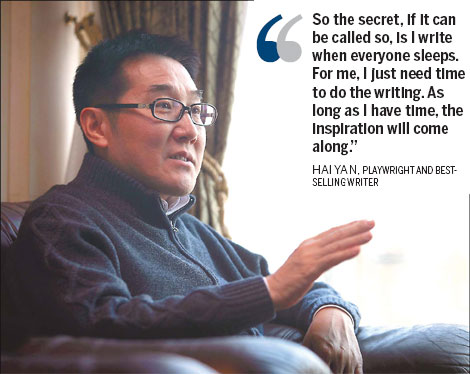Profile
Screenwriter's new project turns lens on newsroom
By Qin Zhongwei and Zhang Peng (China Daily)
Updated: 2010-03-25 08:09
 |
Large Medium Small |
|
The latest script of best-selling writer and playwright Hai Yan is about a life of a journalist. Wang Jing / China Daily |
Top fiction writer reveals his secrets to success in other roles in his life.
Hai Yan's identity is multiple: a best-selling writer and playwright, chairman of a five-star hotel in Beijing, interior designer and collector of Chinese traditional furniture.
The lives of the protagonists in his plays seldom overlap with those titles, as the main characters are typically police officers, prisoners, drug smugglers or dancers. His latest script focuses on the life of a journalist.
Recently, he talked with METRO about his writing, his collections, and how he manages to find time for hobbies despite such a tight work schedule.
METRO: Tell us about your latest work Exclusive Exposure.
HAI: It is a television script. I usually write a novel first, and then it is adapted into a TV series. But this time, Exclusive Exposure was written as a TV script first, and I expect it will be shot in April.
It was inspired by the novel Fire Wrapped in the Paper. The author is a journalist who has worked for a metropolitan newspaper for years. I adopted his idea but restructured the whole story. The TV series will cover some of the hot topics that people nowadays are most concerned about and will unveil these stories through the perspective of a journalist.
METRO: How do you write a story that is based on a person whose profession is unfamiliar to you?
HAI: There are actually two types of things that writers like me want to touch upon: Those I am familiar with and those I am interested in. The protagonists in my previous novels usually have nothing to do with my personal life. But it doesn't matter if I am really interested in them.
I talked with the author of Fire Wrapped in the Paper and got a lot of useful resources from him. I just try to get as many resources as I can from various channels, such as newspapers, for example. But I will select them based on my judgment. Besides, the TV series will be more focused on normal people's daily lives. I have my own experience regarding this.
METRO: What's the difference between this story and your previous ones?
HAI: First, in my previous stories, there is usually only one story, and the story keeps moving forward, which might have some twists and turns in between before reaching the climax. This time, there are several individual stories, but they get connected due to the journalist.
This one is tailor-made for today's mainstream audience. Today's couch potatoes are no longer young students or white-collar workers, who prefer downloading TV series or watching them online.
The audience is mainly the middle-aged women who have nothing to do after finishing their housework at night. So this time, it is no longer the romantic stories that I am good at.
It's about normal people's everyday lives as well as some hot social topics such as surging housing prices, demolitions and so on.
Unlike most of my previous works, this one will not be a tragic story, but one that ends with a sort of happy ending.
METRO: You are famous for turning up-and-coming actors into bona fide stars. Will the new TV series use new actor and actresses?
HAI: There seems to be a consensus by insiders that a TV series under my name is good at "creating stars".
But this time we prefer to use familiar faces, as the market now is very impatient with new faces. It is also risky for producers to use a new actor or actress.
METRO: So do you have a list of the cast crew now?
HAI: What I can tell you is the director this time will be Gao Xixi, with whom we have collaborated before. The list of the main actors and actresses is not finalized yet.
METRO: People are amazed that you are such a prolific writer. You also have a very busy job at the Kunlun Hotel. When do you write?
HAI: My day job is just like everyone else's. The only difference is I am not working 9 to 5, but quite often, I may have to work from 9 am to 9 pm, or even longer. This is common in the hotel business. So the only time I can write is at night. And I try to make it as regular as I can.
So the secret, if it can be called so, is I write when everyone sleeps. For me, I just need time to do the writing. As long as I have time, the inspiration will come along.
METRO: You are also an interior designer known for refurbishing the Kunlun Hotel. At the same time, you are also an acclaimed collector of rosewood furniture. How can you be expert in so many areas?
A: When I started collecting rosewood furniture, I did not collect it to make money or become an expert in this field, but simply because I love it. It is just like when I wrote my first novel, The Plainclothes Policeman. I didn't dream of becoming a great writer. I just wanted to prove that I could do it and do it well.
People always ask me about the secrets of success. But my experience, I think, may not apply to today's young people. Young people today always have big and far dreams but they take baby steps in real life. But I really suggest that they focus on the moment, right now.
For me, I just do what I like, and keep doing it. That's it.
China Daily









